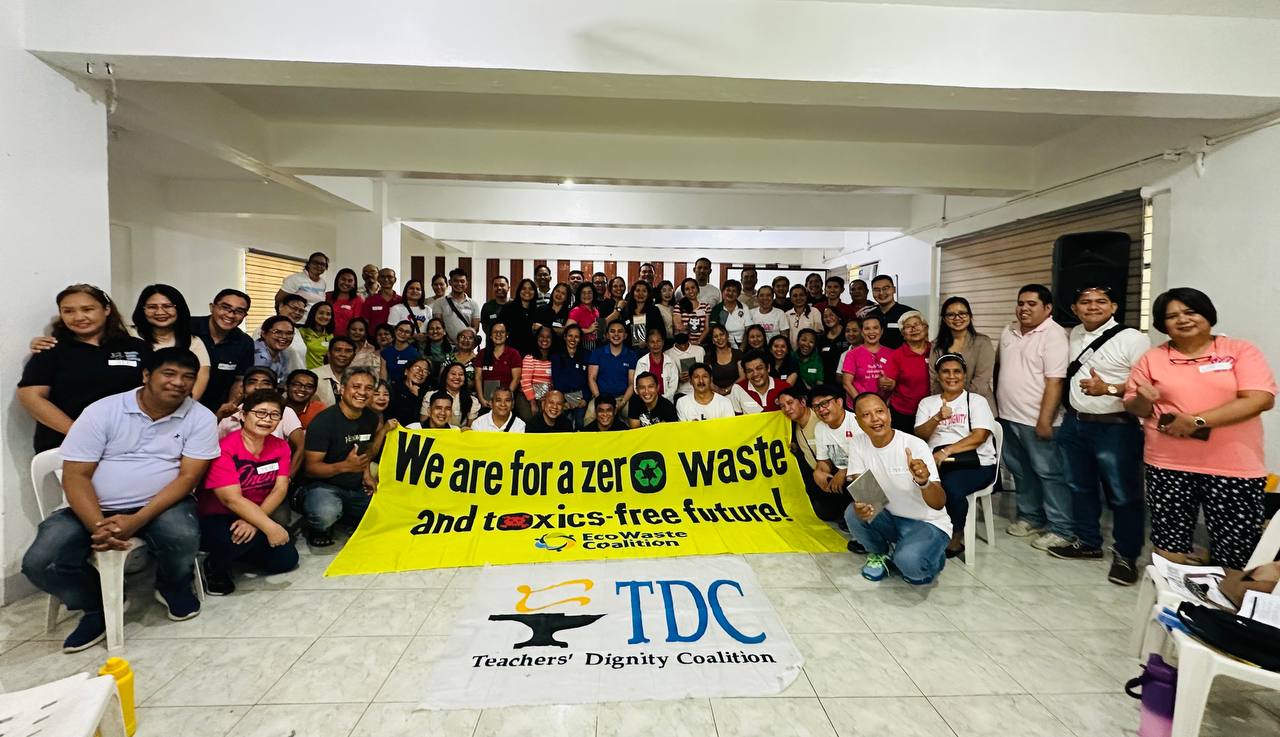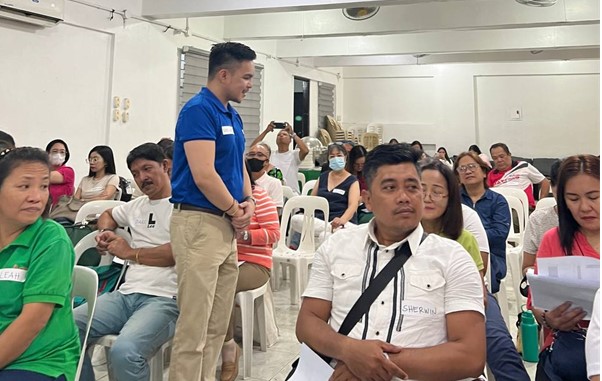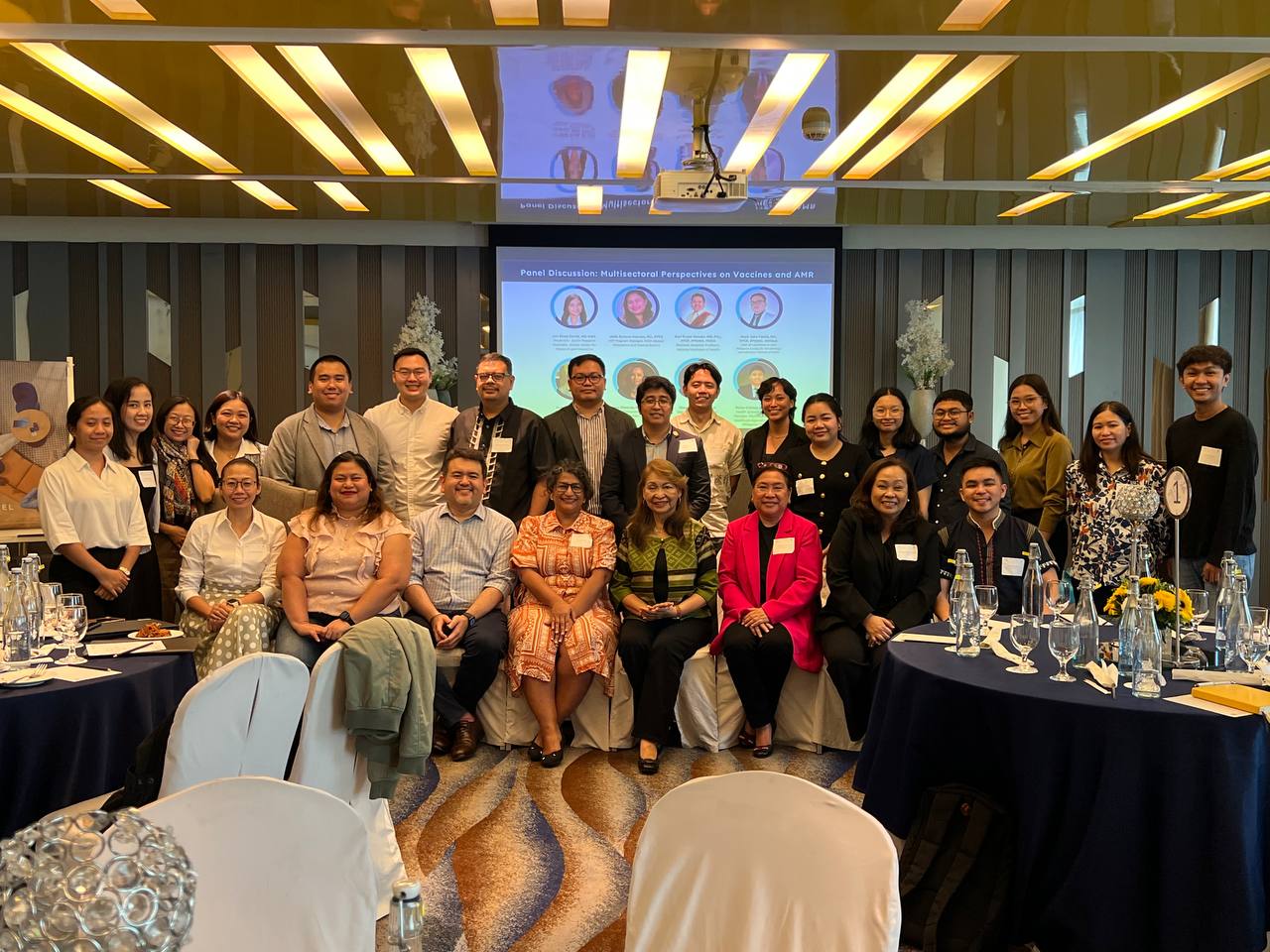
Hands-On Learning, Hands-Off Hazards: Chemical Safety in the Classroom
On 11 June 2024, a collaborative seminar between the EcoWaste Coalition and the Ateneo School of Medicine and Public Health (ASMPH) Centre for Research and Innovation (ACRI) was held at Caloocan High School. The event, organized in partnership with the Teachers’ Dignity Coalition, focused on chemical safety in the classroom and was attended by approximately 100 elementary and high school teachers and school leaders.
Dr. Geminn Louis C. Apostol, the Environmental Health Flagship Program Head at ACRI, tackled the various possible chemicals students may be exposed to in the classroom through a plenary lecture. The teachers were oriented on the possible health effects of the hazards, how to identify these, and what can be done to mitigate the exposure.

Dr. Gelo Apostol provides a lecture on common environmental toxicants in the classroom.
The plenary lecture was followed by an interactive session with the teachers in breakout groups, discussing their learnings and other questions or concerns that they had with their own classrooms. Together with their facilitators, the teachers also systematically identified potential chemical hazards in the classroom and its surroundings. The facilitators included Ms. Anna Enriquez, the project manager, Dr. Percival Lao, Dr. Sary Valenzuela, Ms. Noelle Cubacub, and Ms. Maduretno Asvinigita, ACRI’s research fellow from Indonesia under Southeast Asian One Health Network (SEAOHUN).
Afterwards, each group was tasked to develop a creative learning and educational material to use in the classroom to raise chemical safety awareness among their own students. The activities sparked significant interest among the teachers, producing a variety of creative tools, from songs to posters. One key topic was the extension of the traditional 3Rs (Reduce, Reuse, Recycle) to 6Rs, incorporating the concepts of Rethink, Refuse, and Repair, as discussed by Dr. Apostol.
Elementary and high school teachers discuss and identify the possible chemical toxicants in the classroom
Manny Calonzo, convener of the EcoWaste Coalition, gave insight into the safety of tarpaulins, registered crayons, and colored markers, highlighting the hazards posed by heavy metals in plastics. “We found out that most tarpaulins, those commonly used in schools and especially those used during campaign season contain very high levels of cadmium. Cadmium is a very toxic heavy metal which can also be found in unregulated crayons,” said Mr. Calonzo, highlighting the importance of choosing toxic-free educational learning materials in school and the classroom.
This educational seminar was part of the on-going partnership between ACRI and Ecowaste Coalition, in the pursuit of both raising awareness and also empowering educators with practical tools and strategies to address chemical hazards, ensuring a healthier future for all Filipino children.
As a result of this activity, an educator’s guide was developed with the aim to help teachers craft educational materials regarding chemical hazard identification in the classroom. Teachers play a pivotal role in maintaining safe classroom environments. This entails being aware of the potential chemical hazards present in everyday school supplies and maintenance products and knowing how to manage and mitigate these risks effectively.
The material may be accessed here.
(L-R) ACRI Facilitators Noelle Cubacub, ACRI EnviHealth Flagship Program Asst. Head Dr. Sary Valenzuela, ACRI EnviHealth Flagship Program Head Dr. Gelo Apostol, Former President of EcoWaste Coalition and Toxics-Free Committee Lead Manny Calonzo, ACRI EnviHealth Flagship Program Asst. Head Dr. Percival Lao, Project Manager and Research Associate Anna Beatrice Enriquez, SEAOHUN Research Fellow Gita Maduretno
-

The Unseen Link: Vaccines and Antimicrobial Resistance in the Philippine Context
Antimicrobial resistance is already claiming lives, and the global pipeline for new antibiotics is shrinking. In August 2025, experts gathered to explore a critical question: Can vaccines become a frontline weapon against AMR? The science is clear—by preventing infections, vaccines reduce antibiotic use and slow resistance. But translating this into action means confronting data gaps, political barriers, and financing challenges. As one expert noted: "When we vaccinate, we reduce the frequency of these diseases. That means fewer antibiotics—used and misused." With no country in the Global South yet integrating vaccines systematically into AMR strategies, the Philippines has a chance to lead—if stakeholders can move from consensus to action.
-

Advancing vaccine uptake to mitigate antimicrobial resistance (AMR) in low and middle-income countries of South or South-East Asia
This project explores how strengthening vaccine uptake can serve as a key strategy to mitigate antimicrobial resistance (AMR) in the Philippines and across South and South-East Asia. By reducing the burden of vaccine-preventable diseases and the unnecessary use of antibiotics, the study aims to provide actionable recommendations for national and institutional stakeholders to better integrate vaccination initiatives into AMR control efforts, ultimately contributing to stronger, more resilient health systems.
